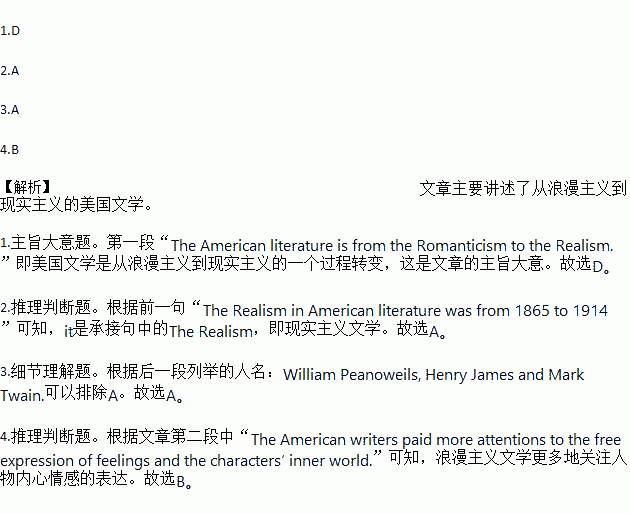题目内容
The American literature is from the Romanticism to the Realism.
The American Romanticism began from the end of 18th century to the outbreak of the Civil War, which is also called the American Renaissance. The period is as well as the time of American Westward Expansion. During the period, there were lots of workforces crowding to the cities, which promoted the industry. The people found that they need their-own literature to record their experiences. So the Romanticism flourished(繁荣).
The Romanticism in American literature focuses on imagination and emotional factors. The American writers paid more attentions to the free expression of feelings and the characters’ inner world. During the romantic period, there were many writers: Philip Freneau, William Cullen Bryant and so on.
The Realism in American literature was from 1865 to 1914, and it takes on th e American spirit, especially in American stories. The Realism against the Romanticism, advocates the people to come down to the earth and get rid of daydreams.
e American spirit, especially in American stories. The Realism against the Romanticism, advocates the people to come down to the earth and get rid of daydreams.
During the 50 years from the Civil War to the WWI, the America had experienced a great change on many aspects, such as the politics, economy, culture and religion. It had changed the nature and the idea of the American society. The writers of new age didn’t agree with the Romanticism of the old age.They were interested in real life and wanted to explain everything relating to the real life, which is to claim the objective reality, to get rid of idealism and Romanticism.
There were 3 main writers at that time: William Peanoweils, Henry James and Mark Twain. Their writings represented the American native customs with their deep rural styles, which uncovered the people’s inner life.
1.What does the passage talk about?
A. The American Romanticism.
B. The History of America
C. The Civil War of America
D. The American literature
2.What does “it” in para4 refers to?
A. The Realism in American literature
B. The American literature
C. The period from 1865-1914
D. The American spirit
3.The representatives of Realism are the following except__________.
A. William Cullen Bryant B. William Peanoweils
C. Henry James D. Mark Twain
4.From the text, we can learn that ________.
A. The two styles of American literature have the same theme.
B. The Romanticism focuses more on peoples’ inner feelings.
C. The Realism encourages people to daydream.
D. The Realism flourished earlier than the Romanticism.
 发散思维新课堂系列答案
发散思维新课堂系列答案

 day. More than two hours of that was spent watching TV.
day. More than two hours of that was spent watching TV.